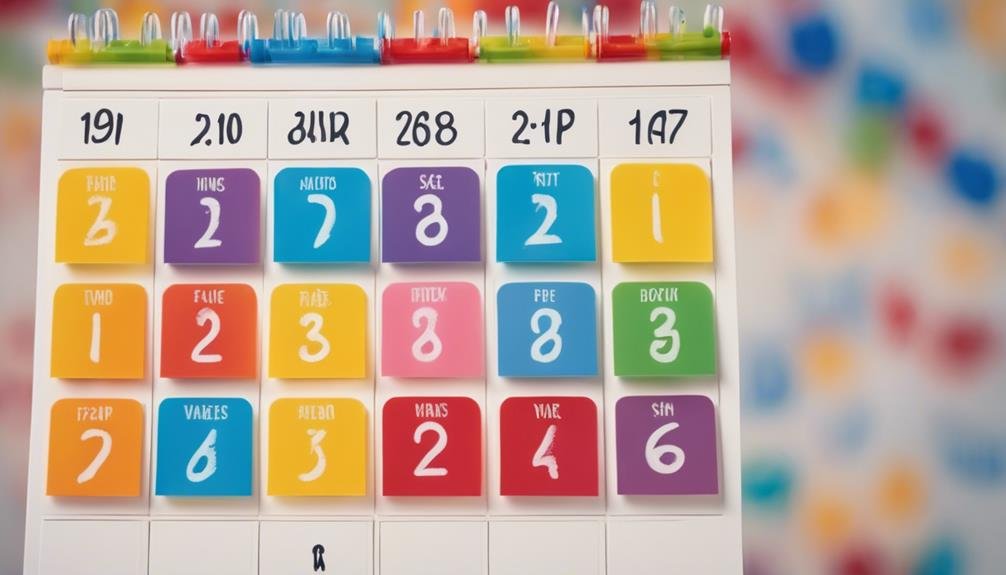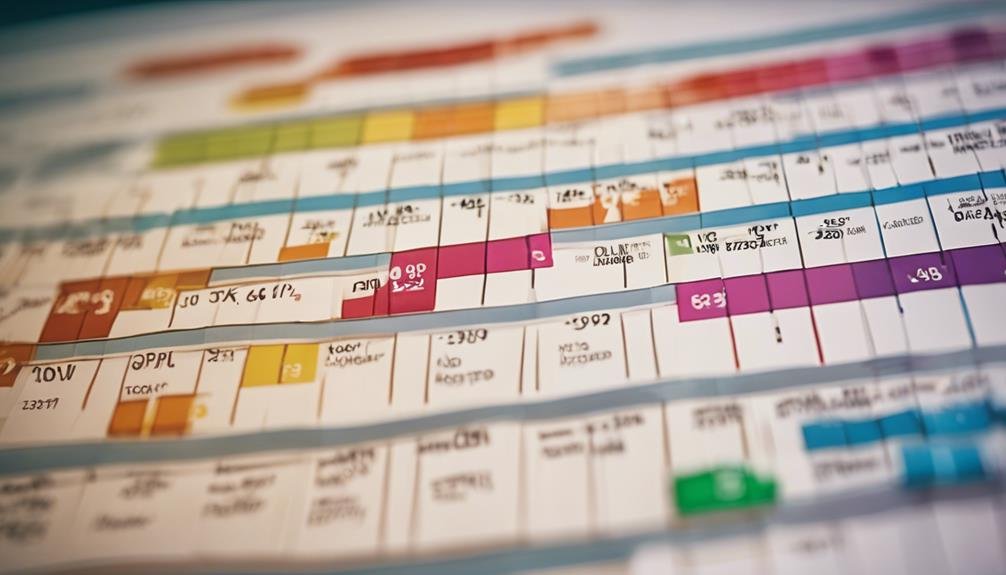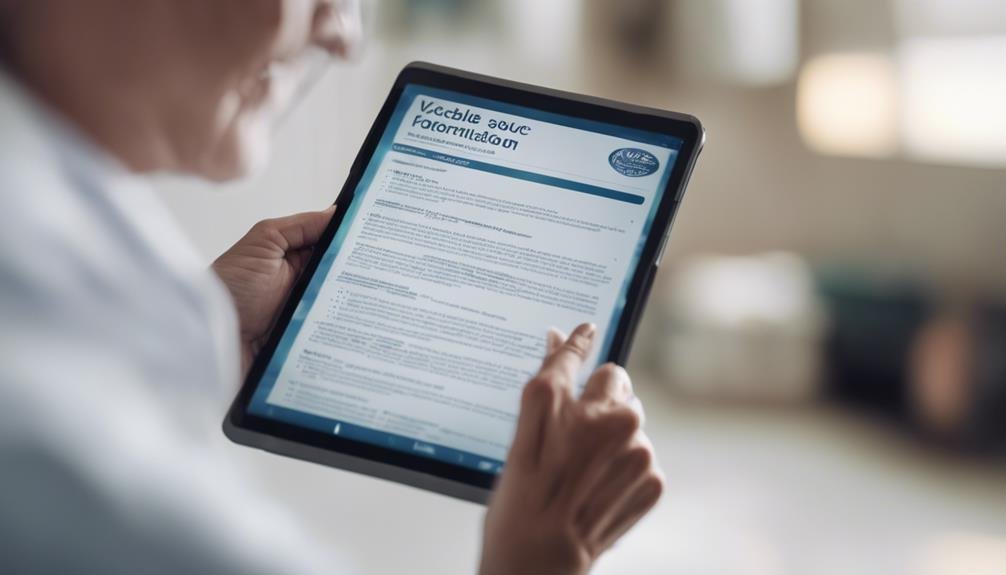Vaccination Schedule for Toddlers: What Parents Need to Know
Ensuring your toddler receives the proper vaccinations may seem like a daunting task, but understanding the importance of following the recommended schedule is key to safeguarding their health. From protecting against serious diseases to contributing to overall community well-being, staying informed about toddler vaccinations is vital. But what exactly does the vaccination schedule entail, and what do parents need to be aware of to ensure their child's protection? Let's explore these crucial aspects further to help you make informed decisions for your little one's health.
Key Takeaways
- Follow recommended schedule for MMR, varicella, Hepatitis A, and flu shots.
- Vaccinations protect toddlers from serious diseases and promote community immunity.
- Understand timing for maximum effectiveness and long-lasting protection.
- Watch for common side effects like redness, swelling, or fever post-vaccination.
- Booster shots are crucial to reinforce immunity and prevent future infections.
Importance of Toddler Vaccinations

Understanding why toddler vaccinations are crucial can help protect your child from serious diseases. Vaccinations aren't only about individual protection but also about community health. By ensuring your child receives their vaccines on schedule, you aren't only safeguarding them but also contributing to the overall immunity of society. Diseases like measles, whooping cough, and polio, which were once common and deadly, have been significantly reduced thanks to vaccines.
It's natural to have concerns about potential side effects, but the benefits of vaccinations far outweigh the risks. Your child's immune system is still developing, making them more susceptible to illnesses. Vaccinations work by safely exposing their immune system to weakened or dead germs, allowing their body to build defenses without getting sick. Remember, protecting your child through vaccinations is one of the best gifts you can give them for a healthy future.
Recommended Immunizations for Toddlers
To ensure the health and well-being of your toddler, it's essential to follow the recommended immunization schedule. Vaccines are crucial in protecting your child from serious diseases. The Centers for Disease Control and Prevention (CDC) recommends a series of vaccines for toddlers between the ages of 1 and 2 years old.
At this stage, your toddler should receive vaccines such as the MMR (measles, mumps, rubella), varicella (chickenpox), Hepatitis A, and the flu shot annually. These vaccines help prevent illnesses that can be harmful or even life-threatening to your child.
The recommended immunizations for toddlers not only protect your child but also contribute to the overall health of the community by preventing the spread of contagious diseases. While it's natural to have concerns about vaccinations, the benefits far outweigh the risks. By staying up to date with your toddler's immunizations, you're taking an important step in safeguarding their health now and in the future.
Understanding the Vaccination Schedule

Ensure your toddler's health and safety by familiarizing yourself with the vaccination schedule recommended by healthcare professionals. Understanding the vaccination schedule is crucial in ensuring your child receives the necessary protection against preventable diseases. The schedule outlines the specific vaccines your toddler needs at different ages to build immunity effectively. By following this schedule, you can help safeguard your child's health and contribute to community immunity.
The vaccination schedule is designed to provide the best protection during vulnerable stages of your toddler's development. It's typically divided into several well-defined visits that coincide with key milestones in your child's growth. Each vaccine is strategically timed to ensure maximum effectiveness and long-lasting immunity.
Familiarize yourself with the recommended vaccination schedule for toddlers to stay informed about the vaccines your child needs and when they should receive them. Healthcare providers are there to guide you through this process and address any concerns you may have about vaccinations. Keeping up with the schedule is a proactive step in safeguarding your toddler's health and well-being.
Common Side Effects to Watch For
To help ensure your toddler's well-being after vaccinations, it's important to be aware of common side effects that you should watch for. While vaccines are crucial for protecting your child from serious diseases, it's common for them to experience mild side effects post-vaccination. These usually include redness, swelling, or tenderness at the injection site. You may also notice a slight fever, fussiness, or fatigue in your little one. These reactions are generally short-lived and can be managed with a cool compress and extra cuddles.
In some cases, more moderate side effects like a high fever or persistent crying may occur. It's essential to monitor your child closely and contact your healthcare provider if you have any concerns. Severe allergic reactions to vaccines are rare but possible. Look out for symptoms like difficulty breathing, swelling of the face or throat, and a rapid heartbeat. If you notice any of these signs, seek immediate medical attention.
Benefits of Timely Vaccination

Getting your toddler vaccinated on time offers them crucial protection against potentially life-threatening diseases. Timely vaccination isn't just about following a schedule; it's about safeguarding your child's health and well-being. Here are some key benefits of ensuring your toddler receives vaccinations according to the recommended timetable:
- Prevents Diseases: Vaccines protect your toddler from serious illnesses like measles, whooping cough, and influenza.
- Protects Others: By vaccinating your child, you also contribute to community immunity, preventing the spread of diseases to those who are more vulnerable.
- Reduces Hospitalizations: Vaccinated toddlers are less likely to require hospitalization due to vaccine-preventable diseases.
- Saves Lives: Vaccines have been proven to save lives by preventing complications and fatalities associated with infectious diseases.
- Promotes Overall Health: Keeping up with the vaccination schedule sets the foundation for your child's long-term health and well-being.
Addressing Vaccine Safety Concerns
When addressing concerns about vaccine safety, it's essential to rely on scientific evidence and expert recommendations to make informed decisions for your child's health. Vaccines go through rigorous testing before being approved for use, ensuring their safety and effectiveness. The benefits of vaccination far outweigh the risks, as they protect your child from severe illnesses and prevent the spread of diseases within the community.
It's normal to have worries about your child's well-being, but it's crucial to differentiate between myths and facts regarding vaccines. Studies have repeatedly shown that vaccines are safe and don't cause conditions like autism. Your child's pediatrician is a valuable resource to address any concerns you may have and can provide you with credible information to ease your worries.
Tips for Easing Vaccination Anxiety

If you're feeling anxious about your child's vaccinations, remember that it's normal to have concerns about their well-being. Here are some tips to help ease your vaccination anxiety:
- Educate Yourself: Understanding the importance of vaccines and how they work can alleviate fears.
- Communicate with the Healthcare Provider: Discuss any worries or questions you have with your child's doctor to gain reassurance.
- Comfort Measures: Comfort your child during and after the vaccination to provide a sense of security.
- Stay Calm: Children can pick up on their parents' emotions, so try to remain calm and positive during the process.
- Reward and Reassure: After the vaccination, praise your child for their bravery and offer a small reward to create a positive association.
Importance of Booster Shots
Understanding the significance of booster shots plays a crucial role in safeguarding your toddler's long-term immunity against preventable diseases. Booster shots are essential because they help reinforce the protection provided by previous vaccinations. While initial doses create a foundation for immunity, booster shots are necessary to ensure that immunity remains strong over time. By administering booster shots at the recommended intervals, you're giving your child the best chance at staying healthy and protected against serious illnesses.
Booster shots are designed to enhance the immune response to specific diseases, ensuring that your toddler's body can effectively fight off infections. These additional doses help the immune system recognize and remember the pathogens, enabling a quicker and more robust defense if exposed in the future. Without booster shots, the immunity acquired from earlier vaccinations may weaken, leaving your child vulnerable to infections that could have been prevented.
Resources for Vaccine Information

For reliable and up-to-date information on vaccines, explore trustworthy sources such as the Centers for Disease Control and Prevention (CDC) website. When it comes to making informed decisions about your child's health, having access to reliable resources is crucial. Here are some valuable resources for vaccine information:
- CDC Website: The CDC website offers detailed information on recommended vaccination schedules, vaccine safety, and common misconceptions.
- World Health Organization (WHO): WHO provides global vaccination recommendations and updates on vaccine-preventable diseases.
- American Academy of Pediatrics (AAP): AAP offers guidance for parents on vaccines, including FAQs and resources for vaccine education.
- Your Pediatrician: Your child's pediatrician is a trusted source for personalized vaccine recommendations and can address any concerns you may have.
- Immunization Action Coalition (IAC): IAC provides reliable and evidence-based vaccine information for healthcare professionals and the public.
These resources can help you stay informed and confident in your decision to vaccinate your child, ensuring their health and safety.
Frequently Asked Questions
Can Toddlers Receive Multiple Vaccines During One Visit?
Yes, toddlers can receive multiple vaccines during one visit. This helps protect your child against various diseases efficiently. Your healthcare provider will ensure the vaccines are safe and necessary for your child's well-being.
Are There Alternative Vaccination Schedules for Toddlers?
Like a compass guiding your journey, sticking to the recommended vaccination schedule for toddlers is safest. Discuss any concerns with your healthcare provider. Straying from the schedule may compromise your child's immunity.
What Should Parents Do if Their Toddler Misses a Vaccine Dose?
If your toddler misses a vaccine dose, contact your healthcare provider immediately. They'll guide you on the next steps to ensure your child's protection. Stay informed, and trust the experts to keep your little one safe.
How Can Parents Manage Pain at the Injection Site?
To manage pain at the injection site, apply a cool compress for comfort. Gentle cuddles and distraction with toys or songs can soothe your toddler. Comforting words and a little extra love go a long way in easing their discomfort.
Are There Any Long-Term Effects of Delaying Toddler Vaccinations?
Delaying toddler vaccinations can have long-term effects on their health, leaving them vulnerable to serious diseases. It's crucial to follow the recommended schedule to ensure your child is protected and stays healthy in the future.
Conclusion
So, remember, like a shield of armor, vaccines protect your toddler from harm. Stay on schedule, watch for side effects, and embrace those booster shots.
Trust in the science, ease your worries, and keep your child safe and healthy.
Together, we can build a wall of immunity, keeping our little ones strong and resilient.
Embrace the power of vaccination, and watch your toddler thrive in a world free from preventable diseases.






